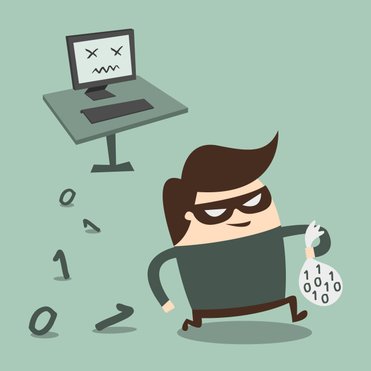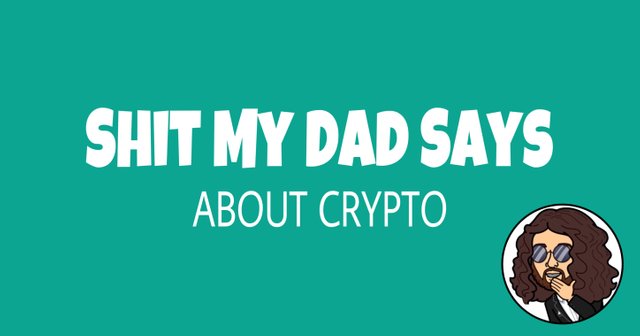Shit My Dad Says About Crypto, Part 1
The Road to Mass Crypto Adoption
So the other day my dad and I drove down from Los Angeles to Laguna Beach. I was on my way to a wedding, and he offered to drive so we could get a little father-son time in. As we came to a stop in traffic, I realized this was a perfect moment to talk to my dad about crypto and do my part to help further the cause of mass crypto adoption. Plus he was literally stuck with no where to go. Now was my perfect chance.
Brekkie - Hey Pops, so when are you going to let me show you how to buy some Bitcoin?
Dad – Did you read that article I sent you from the Wall Street Journal yet?
In typical Dad fashion… he ignored my question and responded with a question of his own. To be fair, he often sends me WSJ articles about Blockchain or Bitcoin, and I often leave them unread. And I know he sends them to me because he genuinely thinks they might be interesting or of some use, but the reality is that the WSJ always lags behind Reddit and Twitter, and I don't like reading old news.
Brekkie – No I didn’t read it. But I saw it’s about the Mt. Gox hack. I’ve read all about it before. WSJ is always behind other news outlets.
Dad – You should read this article. It was really interesting. And it makes me really worried about this Bitcoin thing. How can block-chain be safe if all those people got their Bitcoin stolen off Mt. Grox?
Brekkie – Gox, Dad. Mt. Gox.

So to give you a little background, my dad is definitely a smart guy. He has his MBA and he’s a CPA as well. He also has a lot of experience with real estate and insurance markets. But I’m pretty sure he gets all his news from the Wall Street Journal and New York Times. This isn’t a bad thing, but it basically means that with anything related to Blockchain he’s often weeks or months behind. But back to my Dad's statement about Blockchain safety.. In that moment I realized that my Dad didn't fully understand how Bitcoin and Blockchains work.
Brekkie - Dad, you understand that Bitcoin and the Blockchain didn't get hacked? That it was the exchange called Mt. Gox, that got hacked?
Dad - Isn't it all the same thing? Bitcoin got stolen from the Blockchain.
It was a very good thing that I wasn't the one driving, because I actually threw my hands up in the air at this statement. I took a deep breath and realized that this could be an incredible learning moment for both of us. My dad was about to learn how blockchains work, and at the same time, I was reminded, that Blockchain basics took me a while to fully understand too, and that conversations like the one we were about to have, are exactly what's needed to promote crypto-literacy and mass adoption.
Brekkie - Deep breaths So let's start with the idea that you can't steal anything from "the Blockchain." A blockchain is simply a ledger of account, like what a bank might use, and like what you use as an accountant. Except when we're talking about Bitcoin and most crypto currencies, that ledger is decentralized. And with every new version of the "Block," of the transaction ledger, it includes a record of ALL previous transactions.
Dad - Ok that makes sense. It's like a record of all the transactions going back to the beginning. But what do you mean by decentralized?
Brekkie - I mean, that the Bitcoin blockchain isn't stored on just one computer, but on thousands of them that form a decentralized network.
Dad - And why is that important? And what do miners have to do with all of this?
Brekkie - The decentralized nature of the blockchain is important, because it helps ensure that no one can change the data. In accounting you want to make sure that no one is double-spending, right? Well when humans use a physical currency note, that's easy to prevent because you can't be in two places at the same time, spending the same note. But with a digital currency that's more difficult to enforce. What if people lied? What if two accountants recorded transactions differently?
Dad - Ok. And the miners?
Brekkie - So miners are the people, and now companies, whose computers validate transactions on the network. They are the ones maintaining the network. They all maintain copies of the blockchain, and when new transactions are added to it, the miners' all "talk" to each other and reach consensus, basically agreeing that "yes, transactions, X Y & Z are all valid." There's a lot more to it, but does that make sense so far?
Dad - I think so.
Translation: "Let's go over it a few more times."
And so we did.
I explained again, how each new block in the "blockchain" contains all the previous blocks, and how with each new block, the blockchain gets stronger and stronger. I explained that Bitcoin was designed so that in order to "mine" for Bitcoin, i.e. in order to validate subsequent transactions, miners had to solve the block using a cryptographic algorithm known as SHA-256, and that the reward for solving a block... is a predetermined amount of Bitcoin.
Mt. Gox and How the Blockchain Didn't Get Hacked
Slowly but surely, we started to connect all the dots. Or most of them at least..

Dad - Ok, but now what about Mt. Gr.. Gox?
Brekkie - So do you remember what a public and private key are?
Dad - Yeah, you said they're like a username and password, right? They're what you'd use to access your bitcoins on Mt. Gox.
Brekkie - Yes to the first part. No to the second part. In terms of accessing your bitcoin, which is always on the blockchain, you need your public and private key just like you need a username and a password. Except you can also think of the public key as your bitcoin's address or coordinates on the blockchain, and your private key is what allows you to access that bitcoin. Basically any time you want to create a transaction with your bitcoin, you will need your private key to cryptographically "sign" the transaction, to authorize it.
Dad - Ok, ok. So with Mt. Gox, how could the hackers get the bitcoins? They would need everyone's private keys then?
Brekkie - Yes and no. The Gox hack is still being investigated, and no one knows for sure, but if there wasn't inside help... actually even if there was inside help, the hackers were able to get the private keys for the wallets controlled by Mt. Gox. They didn't need everyone's private keys.
Dad - But don't you control your own private keys? You said you needed your private key to access your bitcoin.
Brekkie - With an exchange it's different. There are decentralized exchanges where you still control your private keys, and then there are centralized exchanges like what Mt. Gox was, where you send your crypto currency to the exchange, and then they act as a middleman or custodian. With centralized exchanges you have a traditional username and password to access your account, and you're not interacting with the blockchain directly. Your bitcoin could be commingled with everyone else's bitcoin in a shared wallet, and the exchange could simply maintain its own ledger of account to track who owns what.
Dad - Well why on earth did all those people keep so much bitcoin on an exchange?
Great question Dad! And for my readers, since you're already here, this is a reminder that you shouldn't keep all your crypto on exchanges! Nowadays we have more mature ecosystem with more robust exchanges like Coinbase and Binance, but it's always safest to store your crypto off-exchange in cold storage.
Brekkie - Mt. Gox wasn't that long ago, but in "crypto years" it was a very long time ago, and times were different. People were too trustworthy of exchanges and there wasn't enough education and emphasis on use of cold storage.
Dad - I'm still not convinced about this crypto thing.
Brekkie - Not yet, Dad.
Not yet.
I hope you all enjoyed this post! Going forward, I will continue documenting my efforts to convince my Dad that crypto is the future. And I hope you'll join me as we both continue to learn and grow. If you have loved ones who are skeptical about crypto, I would also urge you to have similar conversations with them. Every time I discuss crypto with my Dad, my understanding of certain topics deepens, and I also find knowledge gaps that need to be filled. If you don't feel comfortable having those conversations just yet, well then feel free to email this article to them, even if they choose to ignore it.


Every time I mention the blockchain or a related term my family looks at me as if I were an alien hahahaha.
Teaching people who know relatively nothing about the subject and who are resistant to change is a titanic task, it takes a lot of time and above all patience because for many it is something complicated to understand, I would love to read the second part to see if your dad was convinced hahahaha and take some advice.
It's going to be an ongoing conversation.. I wrote "Part 1" but I plan to continue it indefinitely whenever we have these conversations.. I'll be posting them here, and you can find them on Whale Reports as well. Glad you enjoyed!
Oh, this is fantastic and was fun to follow.
Traffic in LA: the rise of crypto adoption due to a captive audience.
My dad is on the "I'm not sure" train too. To be continued, indeed.
Glad you enjoyed it! Getting a lot of positive feedback so it will definitely be continued!
Nice one ;).
I didn't know you were into Cryptos !